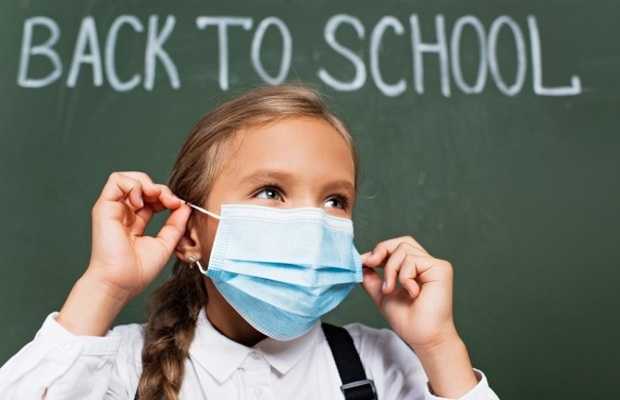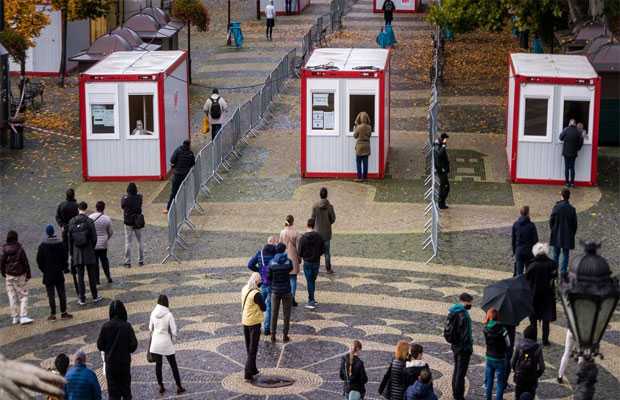Sindh govt. approves COVID-19 SOPs for the reopening schools from Sep 15

The Sindh Education Ministry has approved guidelines for precautionary measures to be followed by students and school staff as the province moves towards the reopening of schools on September 15.
Sindh Education Minister Ghani presided over a meeting of the provincial education department’s steering committee, where participants exchanged views on the COVID-19 SOPs to be implemented and the reopening of educational institutes.
“The current situation of the COVID-19 pandemic has improved a lot,” said Ghani.
“We have finalised SOPs and discussed some recommendations [for the meeting with the education ministers],” he added.
He further added that the Sindh government was of the view that educational institutes should not be reopened all at once but at “different stages”.
Read More : Punjab govt. announces reopening of schools in phases from Sep. 15
“As per our recommendations, classes of grade 9 and above should be resumed from September 15,” he said. “Classes of primary to grade 5 students should be resumed from September 28 whereas those of grade 6-8 should resume from September 21,” he said.
Sindh Education minister also said that these recommendations would be forwarded to the Centre, warning schools from reopening before the date agreed upon by the provinces and federal government.
“If any school reopens before the agreed date, [the action] will be treated as against the law,” he said. “If a school asks for more time for [implementation of] SOPs, then it can be granted,” he added.
The minister said that the results of grades 9 and 10 will be announced on September 15 while those of grades 11 and 12 will be revealed on September 30.
“Marksheets will arrive at educational institutions one week after results are announced,” he said.
The following are the guidelines approved by the Sindh Education Ministry for precautionary measures to be followed by students and school staff.
SOPs for school management
- Regularly clean and disinfect school buildings, classrooms, and especially water and sanitation facilities, as required 24/7.
- Use the recommended and approved materials for disinfecting the premises.
- Adjust school days and timings in a way to avoid any large gathering of students in the classrooms.
- Stagger classes to avoid the mingling of students.
- Adjust academic calendar/syllabus to complete within a given time.
- Split students of Pre-Primary (Nursery / KG), Primary, Lower Secondary, Secondary, and Upper Secondary) in a number of shifts to accommodate sufficient distance amongst students.
- Assign teachers as per adjusted days, timings, and shifts of schools.
- Avoid a large number of teachers in the staff rooms, at any given time, etc.
- Use Saturday as a working day till the pandemic is over.
- Students, teachers, and others with Covid-19 symptoms will not be allowed to enter the schools at all times.
- Ensure that students with temperature etc. immediately return home; hence, parents must wait for their children to get screened. This must be communicated to the van drivers not to leave the school vicinity until all students have entered the school disinfectant gate.
- Wearing a face mask is mandatory for all during the school timings.
- Ensure that the entire school premises is disinfected every weekend on Saturday.
- Regular cleaning of the classrooms, especially, desks, chairs, cupboards, fans etc.
- Ensure that toilets and other common areas are thoroughly cleaned at regular intervals in a day.
- Covered trash bins must be placed inside the classrooms and common areas.
- Display rules and procedures for the students on soft boards in the corridors.
- Schools’ tuck shops will not be allowed to sell edible items. It will be mandatory for the students to bring homemade lunch and water bottles.
- The vendors selling food items outside the school premises must be removed with the help of Police Station / DCs concerned.
- Ensure that children will not be allowed to play outside the school premises.
- Classrooms, labs, libraries, and offices should be well ventilated by using natural ventilation (opening windows) and by keeping the doors open at all times during the school timings.
- A floor map with the movement plan must be prepared to ensure the smooth movement of students at all times to avoid the gathering of students in one place. Morning assembly must be held in the respective Class Room.
- Promote and demonstrate regular hand washing and positive hygiene behaviours and monitor their practices.
- Place hand wash/sanitisers in halls, and near exits where ever possible, especially staff rooms/reception area.
- Ensure trash bins are removed daily and disposed off safely.
- Students will not be allowed to share their belongings with each other, including stationery items, books, water bottles, lunch, etc. Therefore, students must bring all their required items each day.
- Students to be coached to assist the management to make the schools safe working/learning places for everyone.
- Monitor measures to be taken by school system to provide the safety of students.
- Encourage community/parents to cooperate with school management regarding flexible operational/academic plans, students’ attendance, etc.
- Ensure strict compliance of SOPs to make schools as safe learning places.
- Monitor the functioning of help-desk for students and parents in the schools.
SOPs for teachers
- Ensure that teachers are ready to cope with the complex situation of Covid-19 and teach effectively.
- Ensure teachers move away from their traditional role to non-traditional roles as facilitators of students learning.
- Use a variety of pedagogies and assessment practices.
- Ensure teachers are developed to offer online education to students.
- Ensure classroom furniture is properly placed with adequate distance and social distancing among students and teachers.
- Make sure to listen to students’ concerns and answer to their questions.
- Teach the students to cover the mouth and nose when coughing and sneezing with the elbow, followed by washing hands.
- Encourage students to prevent and address the stigma associated with Covid-19, as it is like any other illness.
- Encourage students to express and communicate their feelings.
- Incorporate relevant health education messages into the teaching-learning process.
- Monitor students’ frequent washing their hands in order to keep the environment safe.
- Remind students that they can model healthy behaviours even at home for their families
SOPs for students
- Wear a face mask during travel and schooling at all times.
- Wash your hands frequently, always with soap and water for at least 20 seconds.
- Remember not to touch your face.
- Do not share cups, eating utensils, food, or drinks with others.
- Be a leader in keeping yourself, your school, family, and the community healthy.
- Share what you learn about preventing disease with your family and friends, especially with younger children/classmates, in morning assembly presentations in class.
- Don’t stigmatize your peers or tease anyone about being sick.
- Tell your parents, another family member, or a caregiver if you feel sick, and ask to stay home.
SOPs for parents
- The parents being the primary caregivers must ensure that their children are taking the necessary precautions to save themselves from Covid-19 and its spread.
- Explain to your child what is happening in simple words and reassure them that they are safe.
- Parents are advised not to send their children to schools in case they display any symptoms of Covid-19 which include fever, coughing, sneezing, and shortness of breath.
- Ensuring good hygiene, which requires covering the mouth and nose with a bent elbow or tissue for cough or sneeze, also disposing off the used tissue immediately in a closed bin of each class.
- Help children cope with stress.
- Children may respond to stress in different ways and address them carefully.
- Common responses include having difficulties sleeping, bedwetting, having pain in the stomach or head, and being anxious, withdrawn, angry, clingy or afraid to be left alone.
- Respond to children’s reactions in a supportive way and explain to them that they are normal reactions to an abnormal situation.
- Listen to their concerns and take time to comfort them and give them affection, reassure them they’re safe, and praise them frequently.
- Model good hygiene practices for your children.
- Parents will be responsible to ensure the safe transportation of their children to school.
School Management Committee/Parent-Teacher Association/Civil Society/Community
- Ensure provision and implementation of a safe environment in schools, as being proposed.
- Monitor measures taken by the school system to provide the safety of students.
- Encourage community/parents to cooperate with school management regarding flexible operational/academic plans, students’ attendance, timely payment of fees, etc., to inculcate a friendly and facilitating environment.
- Ensure strict compliance of SOPs to make schools as safe learning places.
- Encourage schools to offer online education by using low technology to those students who remain absent during their sickness for continuity of learning.
- Encourage schools to use home assignments for students to cover-up the syllabus.
- Encourage schools to use continuous assessment for proving immediate feedback to students for improving their learning.
- Given the unprecedented situation, while GoS has provided SOPs and will facilitate wherever needed; ownership and assistance from the local community / Civil society is essential to ensure regulation of SOPs.
Transport
- All parents/ van drivers must strictly follow the route map shared by the schools and also drop the children and pick them using only the gate designated to them. This must be done to avoid gathering of individuals at any gate and must be strictly adhered to it.
- The van/vehicle is thoroughly cleaned/disinfected before the start of each shift/day.
- The van drivers must ensure that all the students/staff, including himself, are wearing masks before boarding the School Van and are not sitting next to him (driver) and that the van/vehicle is not overcrowded.
- The van drivers must wait near the school vicinity for a reasonable time, so that all students may get screened for body temperature at the school gate to allow entry in the school.
- The van driver must leave only after all students are through so that no child is left outside the gate in case of fever. In case a child is identified with increased body temperature, the van driver will immediately take the child back home.
- Students living nearby are encouraged to either walk with an adult or cycle to school.






